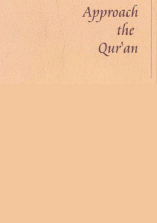Approach the Quran

Influence
Amongst the inward morals of reciting the Glorious Qur'an is what Imam Al-Ghazali called "Influence", meaning that a person's heart should be influenced when reciting the Glorious Qur'an. This influence varies according to the meaning of the verses one reads, i.e., one's heart should be overwhelmed with fear, hope, or sadness in response to the subject-matter of the Verses he reads. In this way, when one reads the following Quranic verse, (But, without doubt, I am (also) He that forgives again and again, to those who repent, believe, and do right, who, in Fine, are ready to receive true guidance.) [1]He should consider the four prerequisites of gaining Allah's forgiveness, which are mentioned in the verse.
Likewise, when reading surat Al-`Asr - which reads, (By (the token of) time (through the ages ).' Verily, Man is in loss. Except such as have Faith, and do righteous deeds, and (join together) in the mutual teaching of Truth, and of Patience and Constancy– one should reflect upon these four conditions of exemption of loss.
Moreover, when reading the Qur'anic verse that reads: The mercy of Allah is (always). near to those who do good.) [2]Should know that good-doing includes all the above-mentioned conditions of success and gaining Allah's forgiveness.
Wuhayb ibn Al-Ward said, "We have contemplated the Prophetic hadiths and admonitions and discovered that nothing is more impressive nor makes the hearts more tender than reciting, understanding, and pondering on the Glorious Qur'an.
The influence of a believer's heart, when reading the Glorious Qur'an, varies according to the context of the verses he reads. For instance, his heart should be overwhelmed with fear when he reads verses dealing with threats and punishment. When reading verses speaking about Allah's mercy and forgiveness, his heart feels great delight. When reading verses, explaining Allah's Names and Attributes, his heart is filled with the Glory and Majesty of Allah.
We recall, in this connection. What is reported on the authority of `Abdullah ibn Mas`ud who said, "The Prophet (peace be upon him) said to me, (Recite (the Qur'an) to me) I said, 'O Allah's Messenger, shall I recite (the Quran) to you while it has been revealed to you'?' He said, Yes. So, I recited sarat An-Nisa', but when I recited the verse: How (will it be) then when We bring from each nation a witness and We bring you (O Muhammad) as a witness against these people, at he said, 'Enough for the present' I looked at him and beheld his eyes were overflowing with tears."[3]
It is no wonder that some righteous men fell dead or unconscious when reciting or listening to some Qur'anic verses dealing with the threats and torment in the Hereafter.
If a reciter of the Glorious Qur'an reads the Qur'anic verse that reads: (Our Lord! In Thee do we trust, and to Thee do we turn in repentance: to Thee is (our) final Goal.) [4] and the verse that says: )We shall certainly bear with patience all the hurt you may cause us. [5] and does not place his trust in Allah and observe patience, he should exert himself to abide by these virtues.
Otherwise, he will incur curses upon himself when reading Qur'anic verses like the following:
(Behold the curse of Allah is on those who do wrong.)
(Hud: 18)
)Grievously odious is it in the sight of Allah that ye say that which ye do not).
(As-Saff: 3)
(Yet they heed not and they turn away.)
(Al-Anbiya': `l)
(Therefore shun those who turn away from Our Message and desire nothing but the life of this world.)
(An-Najm: 29)
(Those who do not desist are (indeed) doing wrong.)
(Al-Hujurat: 11)
Likewise, such a man will be included in the description of the following Qur'anic verses:
(And there are among them. illiterates, who know not the Book. but ( see therein their own) desires.
(Al-Baqarah: 78)
(And how many Signs in the heavens and the earth do they pass by? Yet they turn (their faces) away from them.
(Yusuf: 105)
Therefore, it is said that one who does not abide by the morals of the Glorious Qur'an would be called by Allah: "What do you want from My Words as long as you ignore me?"
The similitude of one who reads the Qur'an and insists on disobeying Allah is as a man who, having received a letter from his king bidding him to do something, insists on disobeying his king's order while he continues to read his letter.
One who abstains from doing good is referred to by the Qur'anic verse that reads,
(But they threw it away behind their backs and purchased with it same miserable gain and vile was the bargain they made. (
(Al `Imran: 187)
In this context, the Messenger of Allah (peace be upon him) said,
"Recite (and study) the Qur'an as l0ng as your hearts are in agreement as to its meanings, but if you have differences as regards its meaning, step reading it then. "[6]
Allah, Most High, highlights the characteristics of His devout believers, saying,
(When they (believers) hear His Signs (verses) rehearsed, find their faith strengthened, and put (All) their trust in their Lard.
(Al-Anfal: 2)
[1] Surat Taha: 82.
[2] Surat Al-`Araf: 56.
[3] Reported by Al-Bukhan and Muslim.
[4] Surat Al-Mumtahinah: 4.
[5] Surat Ibrahim: 12.
[6] Reported by Al-Bukhari and Muslim.
